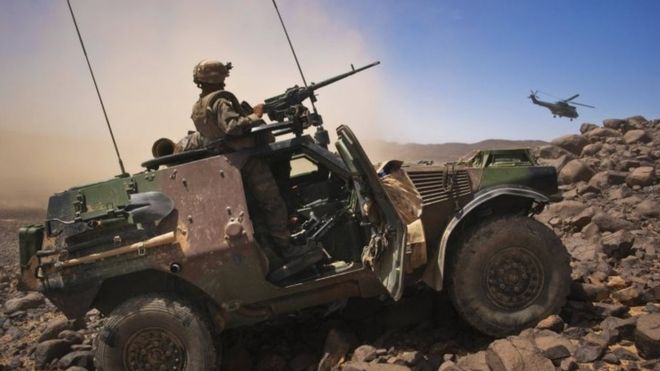
French and Malian troops killed or captured more than 30 extremists and dismantled a jihadist training camp during a major counter-terrorism operation near Mali’s border with Burkina Faso, the French military told AFP on Friday.
The operation is the first since French forces set up a base south of the bend of the Niger River, building an advance position outside the town of Gossi in the heart of the restive Gourma region.
“Over 30 members of armed terrorist groups were neutralized,” the military said, a term meaning that they were killed or captured.
A French military doctor was also killed during the operation, the military previously reported.
The operation, lasting about 10 days, was launched in late March in Gourma, a crossroads region in Mali’s central belt that flanks the border with Burkina Faso.
The doctor was killed when his vehicle hit a mine, bringing to 24 the number of French defense force members killed in counterterrorism operations in the region since 2013.
Some 4,500 French troops are deployed in Mali, Burkina Faso, Niger and Chad in a mission codenamed Barkhane to help local forces try to flush out jihadi groups.
The Gourma area is a haven for armed groups who hole up in dense forests along the border with Burkina Faso to the south, including a group suspected of carrying out several cross-border attacks.
Around 700 French troops and 150 Malian troops took part in the air and ground operation against these bases, the military said.
On the other side of the border Burkina Faso deployed troops “to prevent any attempt by the enemy to escape towards the south of the zone,” French military spokesman Patrik Steiger said.
The operation first targeted the Foulsare forest in the southwest of Gao province, the military said.
The French air force and commandos carried out preliminary strikes as dozens of French armored vehicles in Gossi joined a Malian base at Hombori, 80 km (50 miles) from the Burkina border, which served as a springboard for a joint ground attack.
Troops found “a logistical base” containing rocket launchers and other weaponry, but no jihadis.
“The enemy deserted the area when Barkhane arrived and did not seek to fight,” Steiger said.
The second phase of the operation, which caused the losses on the jihadis’ side, targeted several sites including a training camp in the Serma forest, according to the military.
A pick-up truck, a dozen motorbikes and arms and ammunition, including large amounts of material used to make roadside bombs were seized, the military said.
Extremists linked to al-Qaida took control of Mali’s vast desert north in early 2012, but were largely driven out in a French-led military operation that began in January 2013.
But huge areas are still in the grip of lawlessness, despite a 2015 peace agreement with some armed groups that sought to definitively stamp out the jihadi threat.
Since then, jihadi attacks have shifted from the north towards the more densely-populated center of the country, where it has fanned the flames of local ethnic conflicts which date back years.
Around 15,000 people have fled their homes in the central region of Mopti alone, according to aid groups.
President Ibrahim Boubabar Keita, under mounting pressure to improve security, on Tuesday chaired a senior military panel focusing on the center of the country.
Last Friday, at least 30,000 people marched in Bamako, the capital, to protest at the surge in the violence. Organizers estimated the turnout at 50,000.


